For more than four decades, the University of Washington has honored its best professors for bringing knowledge to new generations. This year the tradition continues as the UW bestows upon seven faculty its Distinguished Teaching Award. The group includes a drama historian who gave up the stage for the classroom, a doctor who balances her teaching loads with a 20-year practice at Harborview, and an anthropologist who is so popular, one-quarter of all UW undergraduates take his course. In addition to teachers, the UW is also honoring TAs, public servants and staff this month.
Distinguished Teaching Award
David Domke
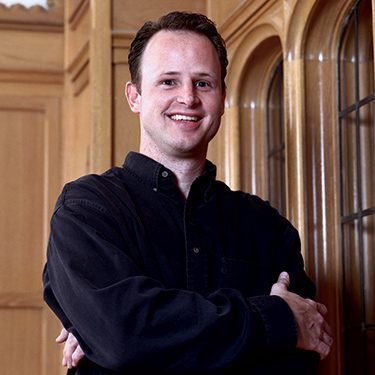 Students remember the day George Stephanopoulos came to class. He presented a lecture, talked about working the West Wing of the White House, and even plugged his book, which, oddly, had Communications Professor David Domke’s picture plastered on the cover. Now that you mention it, that wasn’t Stephanopoulos at all, but Domke giving his class a lesson in politics and humility.
Students remember the day George Stephanopoulos came to class. He presented a lecture, talked about working the West Wing of the White House, and even plugged his book, which, oddly, had Communications Professor David Domke’s picture plastered on the cover. Now that you mention it, that wasn’t Stephanopoulos at all, but Domke giving his class a lesson in politics and humility.
Former reporter-turned-communications-teacher Domke uses inventive ways to engage his classes, such as taking on the roles of Stephanopoulis and Minnesota Governor Jesse Ventura. “I don’t talk like the people I’m impersonating, but teach from the person’s perspective, giving the lecture that they would give because of their knowledge and history and expertise,” Domke says. “The students really buy into it and ask me questions as the person.”
Senior Margaret Stevens describes the effect it had on her. “A year later, I still remember all of Stephanopoulos’ spin tactics and Ventura’s remarkable campaign strategies.” Stevens adds, “I simply cannot think of another professor who has worked as hard, tries different teaching methods, enjoys his work, and acts as a remarkable role model as David Domke.”
Even though he dons someone else’s hat a couple of times a year and students love it, it’s always a stretch for him, Domke says. “It terrifies me. But if I’m going to ask students to stretch themselves intellectually, it’s important that they see me doing it. It’s a risk, but I have to be willing to fail in front of them.”
Another specialty of Domke’s class is the weekly Stump the Professor exercise. In STP, as his students refer to it, class members come up with questions based on current affairs. The teaching assistant chooses a question, which Domke doesn’t see beforehand, and he has 90 seconds to come up with an answer. Then the student reads his or her own answer and the class has an opportunity to polish it. The TA decides whose answer is better.
“I lose about 95 percent of the time,” Domke says. “At first the terror was that they wouldn’t think I was very smart. As a teacher, you want to protect your superiority of knowledge.” But his students appreciate that he sets himself up for possible humiliation, and they respond by working hard on the assignment. “Some of their questions are amazing,” Domke says. “I’m impressed with their research and their answers, and I tell them so.”
Back in the early ’90s, Domke was a reporter for the Atlanta Journal & Constitution, but didn’t feel fulfilled, he says. Since his father and two of his sisters are teachers, he saw the impact they had on the lives of young adults and decided to pursue teaching. He’d planned to teach journalism at the community college level, but as he worked on his master’s degree, he picked up a passion for research, which led him to a doctorate. “I thought I could teach college because I understand research and thought I could effectively teach 18- to 25-year-olds,” he says. He joined the University in 1998, where he developed a reputation as an outstanding teacher, if not a performer.
“Part of his success,” says Robert Tynes, a former student and TA, “rests in his ability to connect with students one-to-one, even though they sit among hundreds of others in the classroom. Students want to attend his class. Professor Domke’s teaching sparks interest in the subject matter and, consequently, students become eager to learn.”
On the first day of every class, Domke promises his students that they’ll never wonder if he wants to be there—he does. And he wants them to be there, too. “In a large classroom, it’s not really the numbers that count, it’s knowing that somebody cares that you’re there,” he says.
Senior David Ko ’02, says, “I soon became unaware of the size of the class and developed an affinity to Professor Domke’s style of teaching and his challenge to his students to excel, not only in academics, but in life.”
Domke finds satisfaction in his work now, he says. “I have tremendous joy in seeing students believe in themselves. If I can get them to see their own possibilities, to see themselves as people who make a difference, that’s as important as acing a test.”—Beth Luce
Erika Goldstein
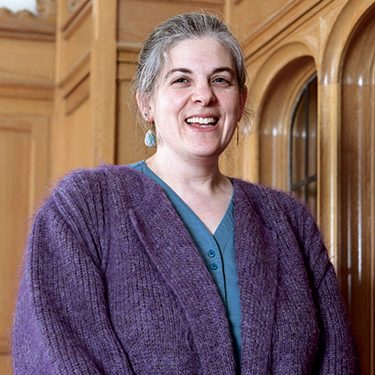 Erika Goldstein can’t be just one person. She chairs and teaches two extensive and complex courses for first- and second-year medical students, which alone is perhaps the heaviest teaching load in the School of Medicine. She coordinates hundreds of volunteer private-practice physicians who mentor students. She conducts problem-based learning sessions, in which she guides students through patient cases; facilitates ethics discussion sessions; works with residents; and was instrumental in designing a new structure of teaching clinical skills, which she will chair.
Erika Goldstein can’t be just one person. She chairs and teaches two extensive and complex courses for first- and second-year medical students, which alone is perhaps the heaviest teaching load in the School of Medicine. She coordinates hundreds of volunteer private-practice physicians who mentor students. She conducts problem-based learning sessions, in which she guides students through patient cases; facilitates ethics discussion sessions; works with residents; and was instrumental in designing a new structure of teaching clinical skills, which she will chair.
Her students claim she attends every clinical skills session, even when she’s not teaching, and is always, always available when they need her. “She has developed a remarkable and truly unsurpassed reputation as a gifted clinical educator and mentor, not just for a few students, but almost literally for the entire School of Medicine,” according to Dr. Clarence Braddock, associate chair of the Department of Medicine.
If that weren’t enough, she has a 20-year-old medical practice of her own at Harborview Medical Center, works in a clinic for Southeast Asian refugees, and has three young daughters.
Yet, somehow, she is “the most well-known and beloved teacher in all of the School of Medicine,” according to Robert Steiner, a fellow professor. “She is deeply committed to the goal of teaching our students to become caring, empathetic, wise and compassionate physicians who are well schooled in the healing arts, as well as the pure science of medicine. … She is an ebullient and motivating master teacher and a warm and compassionate person at the bedside.”
Goldstein says she can explain how she does this. “I have an amazing husband, an organized mind, I’ve been doing it a long time—and some things slip through the cracks.”
She sees herself as a sort of surrogate mother to all the students in the school. But it’s too big of a job. “We’re making some changes in the curriculum because the students deserve certain things, and I can’t keep supplying them all by myself to 100+ first-year students in Seattle and 170 second-year students spread out over five states.”
The change in curriculum involves dividing students up into five “colleges” within the school, each with six faculty members. Students learn clinical skills within these colleges, with explicit benchmarks for progress, as well as receive mentoring in an organized manner, rather than the more informal system now in place.
The catch-all phrase “clinical skills” refers to doctor-patient communication, conducting physical exams, history taking, listening to patients, clinical reasoning, ethics, professionalism and a big black bag full of hands-on healing arts that make students into good doctors. These are the skills that Goldstein teaches.
“She is charged with the difficult task of tearing us away from our physiology/anatomy/biochemistry/etc., textbooks long enough to practice the laying on of hands with a patient, and to ponder why we are here, what it means to be a physician and how we can reach out to all of our patients,” says Catherine Bakewell, one of her students.
“Every year we accept 180 truly remarkable human beings into this school who come in with incredibly high expectations for themselves and a very dedicated sense of what being a doctor is, Goldstein says. “We owe them the best possible education so they can achieve these goals.”
And that’s what society deserves, too, she adds. “Every person who walks through the door has a right to the best care, the care you would want for your mother. And the only way to get there is to teach students superlative clinical skills.”
Goldstein says that everybody who teaches at a medical school thinks their course lies at the center of it. But hers really does. “Clinical skills is the fulcrum. All basic science is taught in the service of patient care. And all research is conducted in the service of patient care. We stand at the place where doctor and patient meet, and that involves all those things. Teaching physicians is really important to society, and it starts here.”—Beth Luce
James Green
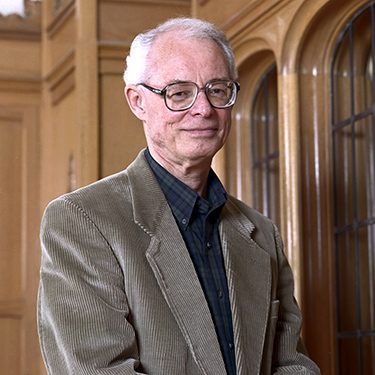 Jim Green took on an introductory anthropology course that nobody else wanted to teach and reinvented it. He developed a course about death for seniors that is one of the most popular courses on campus. He teaches graduate assistants how to reach undergraduates. And he does it with humor, imagination, and innovation. He was one of the first to integrate UWIRED in his courses and helped develop The Write Center to provide individual assistance on writing assignments.
Jim Green took on an introductory anthropology course that nobody else wanted to teach and reinvented it. He developed a course about death for seniors that is one of the most popular courses on campus. He teaches graduate assistants how to reach undergraduates. And he does it with humor, imagination, and innovation. He was one of the first to integrate UWIRED in his courses and helped develop The Write Center to provide individual assistance on writing assignments.
His student evaluations are “routinely stellar,” according to Eugene Hunn, acting department chair. “Above all, Jim Green is the brains, heart, and soul of ANTH 100, our keystone service course,” Hunn says. “By my calculations, fully 25 percent of all UW graduates take this course.”
Teaching introductory classes to 350 or more students from many majors is a challenging task that not many teachers relish. But Green says he enjoys it and tries to make it interesting for them.
“I deliberately try to recall how I felt as a freshman,” says Green. “I try to tailor my presentation to what I think is on the minds of people 18 to 20 years old. It’s like what you do as an anthropologist. When you do field research, you make yourself sensitive to what people are saying and how they’re responding to you.”
Before he began teaching it almost 30 years ago, Introductory Anthropology was a survey course that included a little archeology, a little linguistics, a little evolution, a little genetics—a smattering of all the sub-fields of anthropology. Green revamped it, using as a skeleton some of the interesting and controversial issues of our time that anthropology has something to say about. He begins with human evolution, then moves to race as a consequence of evolution, then the role of gender in different cultures, which leads to traditional family values and how they differ from culture to culture. The class finishes up with belief systems because, at that age, “students are rethinking what they were taught as they grew up,” Green says. “We hit controversial topics all along the way. I try to give an anthropological viewpoint about them.”
Punum Latha, a student in several of Green’s classes, says “Dr. Green is one of the most amazing teachers that I am fortunate to encounter during my years at the UW. He has encouraged me to do my best and to reach for my dreams.”
Discussion of controversy is an integral part of his classes, Green says, and “certainly shows up in my e-mail.” He spends hours every morning answering e-mails from his students. Some are hostile and angry, and some express support for his ideas, Green says. What’s most important to him is that students who won’t speak up in his large classes feel comfortable expressing their views via e-mail.
Green’s other claim to fame is his “Death Class.” Spring quarter, 100 people took the class, and about 50 were turned away. Requests to be included in the class start coming in before Christmas, Green says.
Former student Michelle Barry says students are willing to sit on the floor or windowsills just to hear his lectures. “Every class was packed with people, had extremely high-quality discussion, lots of laughter, and a long line afterwards to talk with Professor Green. He was always patient, listened intently, and was gracious with his time.”
The Death Class, which Green says he teaches in an up-beat manner, begins with a cartoon and includes visits to cemeteries and funeral homes, an autopsy, funeral customs of various religions, a talk from a hospice worker, a funeral school training film on embalming, and coverage of assisted suicide, cremation, ghosts, soul beliefs, near-death experiences, and an ancient custom called “second burial.” At the end of the course, students are asked to write their own obituaries.
“I try to put everything into cross-cultural perspectives, examining how American practices compare to other cultures,” Green says, admitting it is his favorite course to teach. He’s writing a book based on his material, to be published by the University of Pennsylvania Press.
Green’s love for all things anthropological reveals itself in all his classes. “It’s my hope that my students, who think they understand an issue, will see it in a broader, more comparative perspective,” he offers. “I hope they see that our own point of view is always relative to who we are, where we are, and when we are, and that other people have their own points of view for the same reasons.”
As a senior lecturer in the Anthropology Department, Green is regarded as a workhorse, with half-again as many courses as regular faculty members. “The department is very committed to quality teaching and helped make this award possible by backing a senior lecturer on a long-term basis,” he says.—Beth Luce
John Peterson
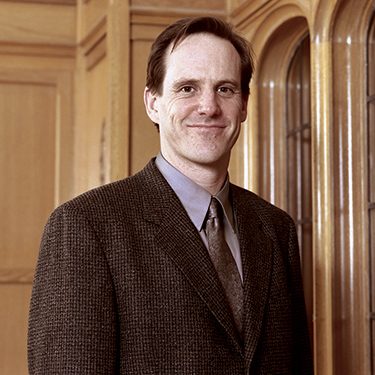 John Peterson remembers his first powerful experience as a writer. He was in the sixth grade, and his teacher asked the class to write a story from the point of view of a quarter. In Peterson’s story, the quarter gets stuck in astronaut Neil Armstrong’s boot and ends up on the moon. Through that assignment, he learned he could let his imagination go wild and still (which surprised him in the strict setting of his parochial school) win praise from his teacher.
John Peterson remembers his first powerful experience as a writer. He was in the sixth grade, and his teacher asked the class to write a story from the point of view of a quarter. In Peterson’s story, the quarter gets stuck in astronaut Neil Armstrong’s boot and ends up on the moon. Through that assignment, he learned he could let his imagination go wild and still (which surprised him in the strict setting of his parochial school) win praise from his teacher.
Now a novelist and an expert on the teaching of both expository and creative writing, Peterson has found his niche as a senior lecturer at UW Tacoma, where he has been largely responsible for designing the writing curriculum. Winner of UWT’s Distinguished Teaching Award for 2002, Peterson brings respect and enthusiasm to his teaching, and students reciprocate—he’s been nominated for this prestigious award three times previously.
Hired at UWT following a national search in 1996, Peterson holds an M.F.A. in creative writing from the University of Alaska, Fairbanks and a B.A. in literature from the University of California at Santa Cruz. His fiction has been published in anthologies and journals, and he has a novel, The Underwater Circus, currently with his agent in New York. It’s a challenge, he admits, to balance his work as a writer with his work as a university teacher.
“I love to teach,” he says. “That might be a liability to my fiction, but it’s a respected and traditional way to integrate a career into the practice of writing. I like being a part of that tradition.”
Peterson, who came to Tacoma from the University of California, Irvine, says he was attracted to UWT primarily because of the interdisciplinary teaching philosophy that makes the instruction of writing something that takes place not only in English classes, but across the curriculum.
“They had really taken the best of writing scholarship and put it into the academic structure of the program.”
Peterson has advised UWT’s student newspaper and currently advises Tahoma West, the campus literary magazine, which won a national design award last year.
Students who nominated Peterson were eloquent in his praise. One graduate, now working in the juvenile justice system, wrote that the foundation Peterson gave her allowed her to make changes in her own life and guide others to examine their lives: “Through writing exercises, the criticism process, feedback, revisions, careful honing, I began to see that life, like stories, can be shaped, molded, edited, revised.”
One of Peterson’s fortes is helping students overcome the fear of sharing their writing with others. He also works hard to see that their writing finds a venue beyond the classroom. His students appreciate his tough evaluations, but say he has a special knack for being a kind and gentle critic.
“What’s really important to me,” Peterson says, “is the human contact in the classroom that sets up the effectiveness of my written response to papers.”—Jamie Martin-Almy, UW Tacoma
Priti Ramamurthy
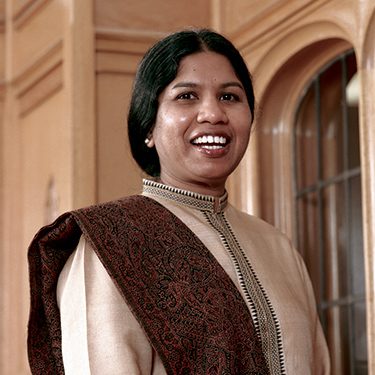 “A good professor is one who can inspire students’ interest in the subject,” according to Fulbright Scholar April Fehling. “A great professor is one who can inspire to move beyond the classroom.” She was talking about Professor Priti Ramamurthy, who teaches about gender, race, culture, and socio-economics in the women studies department.
“A good professor is one who can inspire students’ interest in the subject,” according to Fulbright Scholar April Fehling. “A great professor is one who can inspire to move beyond the classroom.” She was talking about Professor Priti Ramamurthy, who teaches about gender, race, culture, and socio-economics in the women studies department.
Moving beyond the classroom is what Ramamurthy’s teaching is all about. She tries to show her students that they are part of an interconnected world. “I try to get them to see how the headlines are connected to their own lives. Then we can become global citizens. It is the job of a university to prepare students to become global citizens,” she says.
Ramamurthy insists that her students “consider a global, transnational perspective on the issues they take up,” says Judith Howard, department chair. “Many speak of their transformed worldviews.”
A stack of nomination letters for the Distinguished Teacher Award attests to Ramamurthy’s ability to open her students’ eyes. Fehling, who praises other UW professors, nonetheless says, “None has had the power to inspire me and transform my perspective upon my society and my place within it as Dr. Priti Ramamurthy.”
Although her students hail from different backgrounds, “Professor Ramamurthy’s devotion to scholarship and openness to multiple perspectives makes the classroom mix into a real advantage,” says Nancy Kenney, associate professor of psychology and women studies. “The topics covered in her courses are not inherently glitzy or entertaining. … But Priti helps students see the relationship between their shopping at a local mall and the lives of women and children in the most remote regions of the Asian sub-continent.”
Former student Danielle Hayashi says that a class of Ramamurthy’s “was one of the most challenging classes I have taken at this university, not only because it was a heavy workload but, more important, because it required me to question and reflect upon my understanding of the world and my position in it.”
“Learning is not a passive project in Priti’s classroom,” says graduate student Serena Maurer. “Students have been particularly responsive to Priti’s technique of situating conflicting theoretical approaches against each other.”
Ramamurthy says she tries to help students understand that the theories they are learning are common sense, and that they themselves are intelligent and can develop their own theories to explain the world. “They’re part of the system,” she says. “I try to make them acknowledge that being a part of it makes them both privileged and responsible.”
Ramamurthy grew up in an urban, middle-class family in India. Her mother taught in the school she attended, which was very different from typical Indian schools, she says. “We were taught to be creative and to question authority. We weren’t groomed just to take exams.” After high school she spent six months as a volunteer working for a United Nations development project to give food and nutritional aid to women and children in poor villages. “I went from hut to hut trying to judge how well the program was working. It was the first time I’d been in the villages,” she remembers. “That was an absolutely critical experience. It changed the way I thought and brought home to me how important social science work could be.”
After finishing a bachelor’s degree in economics and a master’s in management, she worked as a manager in an Indian government agency. But a fellowship to study in the United States steered her in a different direction. She discovered she loved course work and research. Soon she was working on a Ph.D. at Syracuse University in interdisciplinary subjects. As a graduate student she taught several courses and found she also loved teaching. “I became a teacher through serendipity. I never thought I’d go into it,” she laughs. “It’s a terrific privilege that I can teach and do research as well.”
She returns to India today to work on economic development projects for women.
Oftentimes the connections Ramamurthy is trying to show students don’t sink in immediately. But weeks later, or sometimes years, something happens that makes all the pieces fall into place. “I’m always amazed and thrilled when students come back and say they finally got something. There’s this excitement at them arriving at the point themselves,” she says. “We can only do so much in the classroom. What I’m trying to do is give students the tools to continue this work on their own.”
Ramamurthy praises the quality of students at the UW. “They’re very bright and eager to learn,” she says. “And if you show them how they are capable of learning and being creative and responsible intellectuals, they always respond.”—Beth Luce
Barry Witham
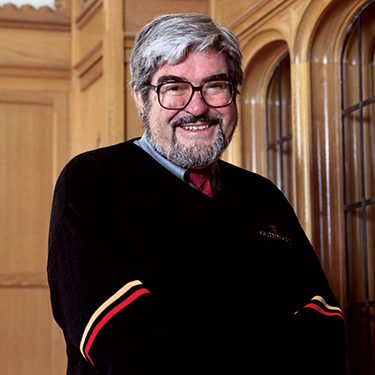 “Yesterday I learned that you can see evolution actually happening every day on the Gallopagos Islands. I never knew that.” The student who imparted that bit of knowledge to theater history Professor Barry Witham is not the first to feel that Witham is as much student as teacher. His friendly demeanor invites students to explore ideas with him and, in the end, they learn almost without realizing it.
“Yesterday I learned that you can see evolution actually happening every day on the Gallopagos Islands. I never knew that.” The student who imparted that bit of knowledge to theater history Professor Barry Witham is not the first to feel that Witham is as much student as teacher. His friendly demeanor invites students to explore ideas with him and, in the end, they learn almost without realizing it.
“He works as if the Socratic method were a thing of nature,” says former student Derek Davidson. “We wander into class a little unsure about this fellow Artaud or Stanislavsky we have been reading (or trying to read). Barry effects a similar stance of bewilderment: ‘Help me with this, I don’t think I quite understand when Artaud says …’ And we are off.”
Graduate student Victor Holtcamp notes that when Witham asks questions such as, “Could you clarify what this means?” and “What about this possibility?” that seem to belie his knowledge and intelligence, he opens up new, enriching lines of discussion. “He genuinely listens to students’ ideas, and they respond by sharing a wealth of insights.”
Sarah Nash Gates, executive director of the School of Drama, describes Witham, who is a former director of the school, as a modest, warm man, a noted historian, and a fan of the Rolling Stones, Husky football, and a good cup of coffee. “He is most approachable, and students flock to him,” she says. “There is no personal agenda, no self-promotion, just a man with high standards, an inquiring mind and enough integrity for two.”
Witham attributes his gracious manner to his mother. When his father died at age 10, his mother raised him and his three siblings with humor, tolerance and strong guidance.
Although his mother was a teacher, he learned how to teach by doing it himself over the past 40 years. Along the way, Witham says, he’s learned some interesting things: how to listen, that students are smarter than we give them credit for and that storytelling is a very compelling and effective way to teach.
But the biggest thing he’s learned is how to help students think for themselves. “My job isn’t to tell them what to think, or even to share my version of the truth,” he says. “My job is to help them figure out what they think the truth is.”
As for the technique of feigning ignorance when guiding his students, he says that’s not totally subterfuge. “It comes from not knowing everything,” he laughs.
An actor and director for many years, Witham says he turned to teaching because he got married, had a baby, and realized he needed a permanent income. So he went back to school, earned master’s and doctorate degrees, and discovered that he really loved teaching.
“I love being able to help folks understand how theater is related to the big picture,” he says, noting that theater history is part of the politics, culture and economics of the society we live in. He also tries to teach students to be tolerant of new and different ideas, to be iconoclastic and to question everything, even what he tells them. He teaches them to be open-minded about different forms of theater. “Theaters are like churches,” he explains. Just as one church is no better than another, tragedy isn’t better than musical comedy.
“His classes combine suspense, laughter and hard work,” says Tina Redd, assistant drama professor at UW, adding that in Witham’s classes, theater history is important to the present day, “not a dusty relic to be memorized for the exam and then forgotten.”
Witham says he enjoys teaching, research and writing in equal measure, and that each feeds the others. “Teaching constantly helps me find other things I’m interested in and want to write about.” He just finished an article to be published in the journal Theatre History Studies about a play dealing with school shootings that is free for high school kids to produce. He’s also finished a book about the Federal Theatre Project and is eagerly awaiting its publication next year by the Cambridge Press.
Bob Nydegger, ’01, comments that he will not soon forget what he learned in Witham’s classes. “It is his example that has inspired and motivated me to be not only a better student and actor, but a better person as well.”—Beth Luce
Carol Zander
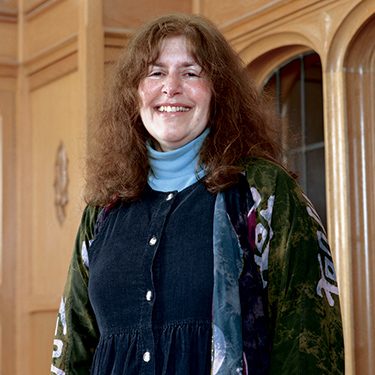 “My approach to education can be summarized as a ‘tough love’ approach,” says Carol Zander, senior lecturer in the computing and software systems program at UW Bothell. “My teaching efforts center around sharing my joy of computer science and mathematics, and helping students to develop the skills that enable in-depth problem solving and continuous learning. And I don’t believe you can acquire these skills without a lot of hard work and effort. So I am demanding, but I also strive to be approachable, supportive, and caring.”
“My approach to education can be summarized as a ‘tough love’ approach,” says Carol Zander, senior lecturer in the computing and software systems program at UW Bothell. “My teaching efforts center around sharing my joy of computer science and mathematics, and helping students to develop the skills that enable in-depth problem solving and continuous learning. And I don’t believe you can acquire these skills without a lot of hard work and effort. So I am demanding, but I also strive to be approachable, supportive, and caring.”
Zander says that while she does have high expectations of her students in the classroom, she finds that they not only rise to the challenge, but ultimately excel because of those expectations. “I try to instill in them a sense of pride in their work,” she says.
In other words, she demands that students care. In return, she cares more. “They want me to care enough to give them good work so that they can learn,” she says. “They want me to care enough to explain things differently until they get it. They want me to care enough to answer e-mail on the weekend and all hours of the night.” Ultimately, Zander says, “my students want to know that I think that they can succeed in this difficult field.”
Numerous letters of support from students and faculty mentioned Zander’s supportive classroom skills for teaching complex material and her significant out-of-class availability. It is this support and industry know-how, along with the confidence that she instills in her students, that makes her so popular.
“With her jovial sense of humor and mastery of the material, she garners respect from her students, holds their interest, and challenges them to learn,” says student William Kallander. “She grades herself constantly by the success of her students. I have darkened her door at ten at night to seek guidance on a project or assignment and have been received with a smile and helpful advice. I am not unusual in this regard.”
Zander says she takes a special interest in helping female students navigate the sometimes difficult waters of a male-dominated field. “In a male-dominated field, I assure female students that it is okay to communicate and collaborate as they do.”
UWB student Camille Scott has found Zander’s mentoring skills and teaching commitment to be invaluable in her journey toward a degree in computing and software systems. “As a female in a male-dominated field, Dr. Zander is a refreshing and remarkable mentor and adviser,” says Scott. “I have often sought her counsel when making academic and career choices. Her voice gave me support, encouragement, and excellent guidance. My experience in the CSS program was infinitely better because of her involvement.”
For Carol Zander, it all comes down to helping students achieve their potential without losing sight of the elegance that remains at the core of computer science.
“Along the way, I try to always interject this field as an art,” says Zander. “Besides the technical concepts, there is beauty in many of the problem solutions. I never want students to lose sight of the beauty.”—Cynthia Scanlon, UW Bothell
Excellence in Teaching Award
Recognizes outstanding educators who are teaching assistants
Chia-Hui Huang
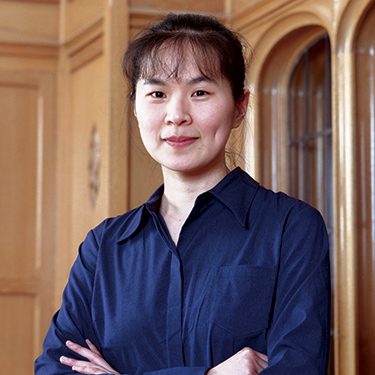 Department: Linguistics
Department: Linguistics
Courses Taught: Introduction to Linguistic Thought, Languages of the World, Survey of Linguistic Method and Theory
Achievements: Huang has taught linguistic classes for several years and will take over the entire syntax series this summer. She creates an engaging learning environment with unusual, in-class exercises: lollipops to help students understand vowel positioning and a mock TV game show called “Wheel of Linguistics” as a way to review course materials. Fluent in Mandarin, English and Spanish, Huang’s knowledge of language, enthusiasm for teaching and willingness to explore new concepts are a hallmark of her instructional excellence.
Quote: “After explaining how tone is distinctive in Chinese…she ended the demonstration with examples of English vernacular, the exclamative “Dude!” used with different intonations to express surprise, fear or disgust. The students learned experientially about Chinese tone and were also able to relate their new knowledge to their native language.”—Linguistics Chair Julia Herschensohn
Steven Wolfman
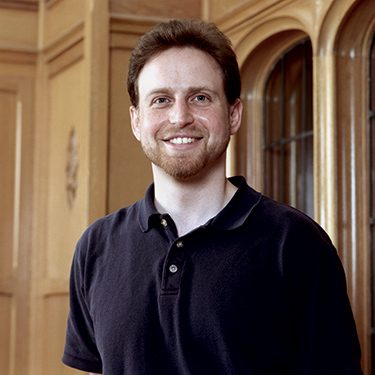 Department: Computer Science and Engineering
Department: Computer Science and Engineering
Courses Taught: Computer Programming, Data Structures and Algorithms
Achievements: Student evaluations of Wolfman’s performance as a TA are almost universally high. In fact, he has garnered greater praise than faculty members who have taught similar courses. Wolfman is driven by the needs of his students and has even altered his research area to encompass educational technology. He fosters discussion among students and creates assignments to be both intellectually stimulating and fun. He has written a paper on the educational advantages of the large lecture hall setting, and he proves it on the first day of class by making his students participate in a “group shout.”
Quote: “Our group shout stuck with me as a compelling metaphor and a harbinger of the astounding vitality Steve would generate three times a week in that cavernous lecture hall. In short, I trusted him, and soon the hall became almost intimate.”—Computer Science and Engineering student Leo Daedalus
Distinguished Graduate Mentor Award
Recognizes an outstanding faculty member who advises graduate students
Thomas L. Daniel
Department: Zoology; 18 years at the UW
Courses Taught: Introductory Biology, Animal Diversity, Biomechanics, Mathematical Biology
Achievements: Daniel is a staunch advocate for graduate students in his department and often puts their welfare above his own. He created the annual Zoology Graduate Symposium 16 years ago to give graduate students an opportunity to showcase their research to students and faculty. When he won a MacArthur “genius” grant in 1996, he donated much of the prize back to the department to provide funding for graduate student research. But his concern isn’t confined to the classroom. He even invited some students to his house for Thanksgiving dinner so they wouldn’t be alone for the holidays. Also an inspiration to undergraduates, he won a Distinguished Teaching Award in 1989.
Quote: “Tom is a master of the pun, a jazz pianist and has a wonderful family. …He makes me realize that it is possible to be an outstanding scientist, to be well respected by your peers, to do interesting research, to be a good teacher and still maintain an interesting and fulfilling life away from work.”—Zoology Graduate Student Michael Dillon
Sterling Munro Public Service Faculty Award
Recognizes a faculty member who encourages community-based instruction
Sergio Palleroni
Department: Architecture; 10 years at the UW
Courses Taught: Design/Build Studio in Mexico, Urban Design of Communities, Architectural Sketching: Phenomenology of Place
Achievements: Palleroni has dedicated himself to helping students learn through community outreach. In 1994, Palleroni co-founded the Design/Build.Mexico Program to construct schools, homes, clinics and libraries in poor areas of Mexico. The program, which won a national education award from the American Institute of Architects, offers a unique experience for UW students for “hands-on” learning. Palleroni also helped create a program to build affordable homes for Native Americans around the state and, with the aid of Professor David Riley, has developed the first state-sponsored migrant housing community in Eastern Washington.
Quote: “Architecture has always been a service profession, but it has too often served only those who can afford it. Under Professor Palleroni’s leadership, students work for clients who could not usually have access to architecture; in this way students are exposed (often for the first time) to community outreach and the idea of all society as clients.”—Architecture Chair Jeffrey Karl Ochsner
Outstanding Public Service Award
Recognizes a faculty or staff member rendering exceptional public service
Anita Ramasastry
Department: Law; 6 years at the UW
Achievements: The Immigrant Families Advocacy Program, created and supervised by Ramasastry, is a volunteer organization that provides support and resources for abused immigrant women. Since its inception, the program has helped more than 100 battered women and children gain legal U.S. residence without having to stay in abusive relationships. Ramasastry has coordinated the efforts of UW law students and pro bono lawyers in assisting these survivors of domestic violence to get their green cards. She has also been instrumental in promoting outreach efforts to other communities and in securing private donations for program funding. Through her tireless efforts, the program has become a lifeline for many immigrant families with nowhere else to turn.
Quote: “Professor Ramasastry’s sincere, personal commitment to social justice has resulted in the ability of many victims of domestic violence to create lives free of violence without risking deportation. Her demonstration of the importance of public service is an inspiration.”—Signe Dortch, supervising attorney, Northwest Immigrants Rights Project
Distinguished Staff Award
Recognizes outstanding service to the University by its staff
Gary Ausman
Department: International Services Office
On the job: Director; 34 years at the UW.
Achievements: Gary Ausman, ’63, ’74, has been the link between the UW and its international community of students, faculty and visiting scholars for 27 years. As the director of the International Services Office, Ausman and his staff serve the fifth largest international community at a U.S. university—2,500 students, 1,000 visiting faculty/scholars and 1,500 others taking non-credit courses. Ausman is essential to both the UW administation and its international community in interpreting complex U.S. immigration laws. And he solves problems with amazing tact, patience, gentleness and diplomacy.
Quote: “After September 11, Gary’s office was immersed in a whirlwind of visa and transit issues, the glare of TV lights and cameras, and the uncertainty of what new legislation would pass through Congress and when. …Gary kept his composure and continued to work tirelessly to assist all incoming international students, many of whom had to scramble for new flights, new visas and new ports of entry into the U.S. Gary’s shoulder-to-the-wheel mentality sent a clear message that amidst a sense of uncertainty pervasive at that time, he would do all in his power to deliver his services as expected.”—Executive Director Anita Verna Crofts, Foundation for International Understanding Through Students
James Boeckstiegel & Brian Davis
Department: Facility Services
On the job: Maintenance Workers; Boeckstiegel has six years of UW service, Davis has four.
Achievements: Boeckstiegel and Davis are the UW’s water whizzes. During the past three years, they not only helped upgrade the University’s irrigation and sprinkler systems but also substantially reduced water and sewer costs while improving campus plantings. Their work helped the UW earn more than $60,000 in water utility rebates. Dedication to water conservation led Boeckstiegel and Davis to notice a defect in certain sprinklers that allowed water to escape even when turned off. They contacted the manufacturer, who investigated the defect. The faulty sprinklers—distributed around the world—were recalled due to their efforts.
Quote: “The two have improved the standards of irrigation systems and the process of construction inspection to an incredible degree. They have done so to the great benefit of the University’s effort to conserve water.”—Campus Landscape Architect William E. Talley
Felicia Hecker
Department: Jackson School of International Studies, Middle East Center
On the job: Associate Director; 28 years at the UW
Achievements: Throughout her six years as associate director of the Middle East Center, Hecker has done more than her official duties of outreach and administrative support. She wrote a history of international studies at the UW for the school’s 90th anniversary. She wrote a successful grant proposal to the U.S. Department of Education, making the UW’s Middle East program one of only 14 in the nation to receive funding for 2000. After the September 11th attacks, Hecker masterminded the Open Classroom lecture series to help the public understand the horrific tragedy. She lined up speakers and was involved in every aspect of the free lectures that packed Kane Hall and Edmundson Pavilion. Through her efforts, the Open Classroom lectures were the most successful of any public series at the University.
Quote: “She independently conceived the Open Classroom project to ensure that the University responded appropriately to the public’s desire for information about the causes and consequences of the attack. She arranged to continue her regular center responsibilities while coordinating the extensive project. Some 15,000 people attended the series of seven talks and hundreds of thousands…have seen them on television, downloaded them from the Jackson School Web site or read accounts in print media.”—Middle East Center Director Ellis Goldberg
Sandra Kroupa
Department: University Libraries
On the job: Librarian; 33 years at UW
Achievements: For the past three decades, Kroupa, ’80, ’85, has dedicated herself to the University of Washington, its students, and its growing Book Arts collection. The 11,000 rare books under Kroupa’s care highlight the art of bookmaking and include unique examples of binding techniques, design and printing. Due largely to her passion, the UW’s collection has garnered national recognition. When she’s not in the library, Kroupa is often giving lectures in UW classrooms and around the nation, obtaining funding for the program, writing articles or curating museum exhibits. Kroupa can also be credited with helping to launch the University’s Ph.D. program in textual studies in the English department.
Quote: “She genuinely has that greatest of staff virtues: the capacity to make the professors whom she assists think that the wonderful ideas she has are their own.”—Classics Professor Lawrence Bliquez
Keith Ward
Department: UWT Copy/Mail Center
On the job: Copy Center Coordinator; 15 years at UW
Achievements: The 350 faculty members and 2,000 students at the University of Washington’s Tacoma campus rely on one small copy center for all of their copying and mailing needs. Ward’s experience and knowledge of copyright clearances, course packet creation and copy duplicating have helped him to increase the efficiency of the center, much to the delight of faculty, staff, and students. When two new buildings were opened last winter, the number of items that passed through the Copy/Mail Center grew dramatically. Ward handled the increased flow without disrupting the day-to-day needs of the UWT community.
Quote: “His wit, wisdom and professionalism have made the copy center a pleasant office to not only collect copies and mail, but also to seek advice and at times just to get a daily dose of laughter.”—UWT Fiscal Specialist Donna Duval